

Our VALUES
KINDNESS COURAGE INTEGRITY
RESPONSIBILITY RESPECT
At Wellington, values shape everything that we do, every day. They are part of every lesson, every conversation, every game. They provide continuity from year to year, and we are proud to walk in the footsteps of Wellingtonians before us.
The pioneering Wellington education, steeped in these values, prepares students to serve, and help shape the world of tomorrow.
Michaelmas Term
Topic
• Still life - drawing
Work Covered
• Observational drawings of sweets and deserts using different techniques and media.
• Development of ideas.
• Oil pastel drawings.
• Artists’ work transcriptions and analysis.
Key Skills
• Learn to record accurately from life.
• Learn to apply a wide range of graduated tones to model 3D form.
• Explore different approaches to developing ideas, both through photography and drawing.
• Learn to blend oil pastels tonally to model 3D form.
• Learn about Art History.
• Learn to write about artists’ work.
• Learn specialist Art vocabulary used to describe tone and composition.
Assessment
Students’ work is assessed in an ongoing basis, using the success criteria specified for each task. Students are assessed based on acquiring the skills required to access IGCSE. Overall grades are holistic, taking into consideration all the work produced throughout the year.
Topic
• Abstract Art - painting Lent Term
Work Covered
• Geometry: abstract drawing.
• Composition.
• Development of ideas.
• Colour theory.
• Brush control.
• Painting with acrylic paint.
• Artists’ work transcriptions and analysis.
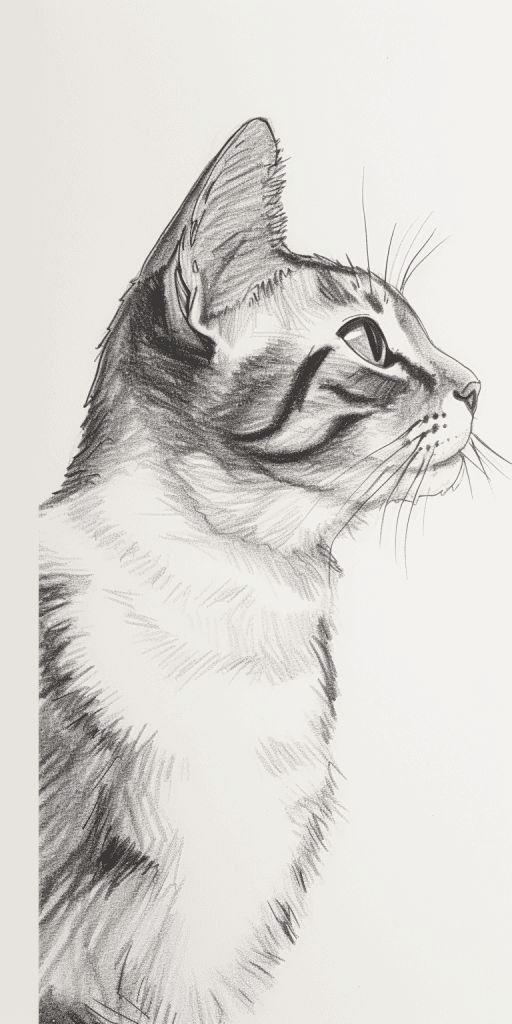
Key Skills
• Learn to produce creative work in response to artists’ references, exploring ideas and recording experiences.
• Learn about the formal elements of Art: colour, tone and composition.
• Learn about colour theory and how to mix it to achieve tone and hue.
• Learn to use acrylic paint and apply it with control.
• Learn about the history of Art and major movements: Abstract Art.
• Evaluate and analyse artwork in visual and written forms, whilst becoming familiar with specialist vocabulary used to talk about the formal elements.
Assessment
Students’ work is assessed in an ongoing basis, using the success criteria specified for each task. Students are assessed based on acquiring the skills required to access IGCSE. Overall grades are holistic, taking into consideration all the work produced throughout the year.
Summer Term
Topic
• Work Covered
•

Key Skills
• Learn about the formal elements of Art: line, tone, texture and composition.
• Produce creative work in response to artists’ references, exploring ideas and recording experiences.
• Become proficient in drawing and mixed media techniques.
• Increase proficiency in the handling of different materials and tools.
• Learn about the history of Art and major movements.
• Evaluate and analyse creative works in visual and written forms, whilst becoming familiar with specialist vocabulary.
Assessment
Students’ work is assessed in an ongoing basis, using the success criteria specified for each task. Students are assessed based on acquiring the skills required to access IGCSE. Overall grades are holistic, taking into consideration all the work produced throughout the year.

Michaelmas Term
Topic
• Digital Literacy & Computer Systems Python Basics
Work Covered
• Digital Literacy & Computer Systems: Introduction to digital literacy, understanding computer systems, hardware vs. software, file management, and basic productivity tools.
• Python Basics: Introduction to Python coding, variables, data types, simple input/output, arithmetic, and control structures (if, else, loops).
Key Skills
• Digital literacy
• Systems understanding
• Programming basics
• Problem solving
• Algorithmic thinking Assessment
• Ongoing assignments in all topics
• End-of-unit test on Digital Literacy & Computer Systems
• End-of-unit test on Python Basics
Lent Term
Topic
• Using Computers Safely & Responsibly
• VEX IQ Robotics – Building & Programming
Work Covered
• Using Computers Safely & Responsibly: Online safety, responsible use of technology, data protection, privacy, cyberbullying awareness, and digital wellbeing.
• VEX IQ Robotics: Introduction to robotics using VEX IQ, building and testing robot designs, programming with block and text-based code, solving challenges.
Key Skills
• E-safety and responsible digital citizenship
• Awareness of online risks
• Robotics
• Programming
• Teamwork and problem solving
Assessment
Ongoing assignments in all topics
Practical robotics project and challenges
End-of-unit test on Using Computers Safely & Responsibly
Summer Term
Topic
• Networks
• Spreadsheets
Work Covered
• Networks: Basics of networks, LANs and WANs, topologies, internet structure, protocols, and cloud computing.
• Spreadsheets: Introduction to spreadsheets, formulas, functions, data entry, and using spreadsheets for problem solving.
Key Skills
• Network fundamentals
• Internet understanding
• Digital communication
• Data handling
• Spreadsheet proficiency
• Logical reasoning
Assessment
Ongoing assessment and end-of-unit test
DESIGN
Michaelmas Term
Topic
• Memphis Design pencil box
Work Covered
• Design principles from the Memphis group
• The design processes
• Wood and wood products
• Perspective drawing
• Safe working practices
Key Skills
• Generate concept sketches
• Present design ideas graphically
• Apply a design process
• Work with plywood and pine
• Use the reciprocating saw, coping saw, tenon saw, pedestal drill, hand drill, cordless drill
• Sketch to generate a top view and marking out plan
• Draw in perspective and present design ideas graphically
Assessment
Design Test 10%

DESIGN
Topic
• Graphic Design and Communication - CAD
Work Covered
• Parametric Modelling
• Sketching
• Solid Modelling
• Materials and Textures
• Learning the Software
• Communication
Key Skills
• Understand how to create and manipulate 3D models using parametric design principles, where dimensions and relationships can be easily modified
• Master 2D sketching to create the foundation for 3D models. Learn about constraints, dimensions, and best practices
• Create 3D solid bodies using tools for extrusion, revolve, loft, and more
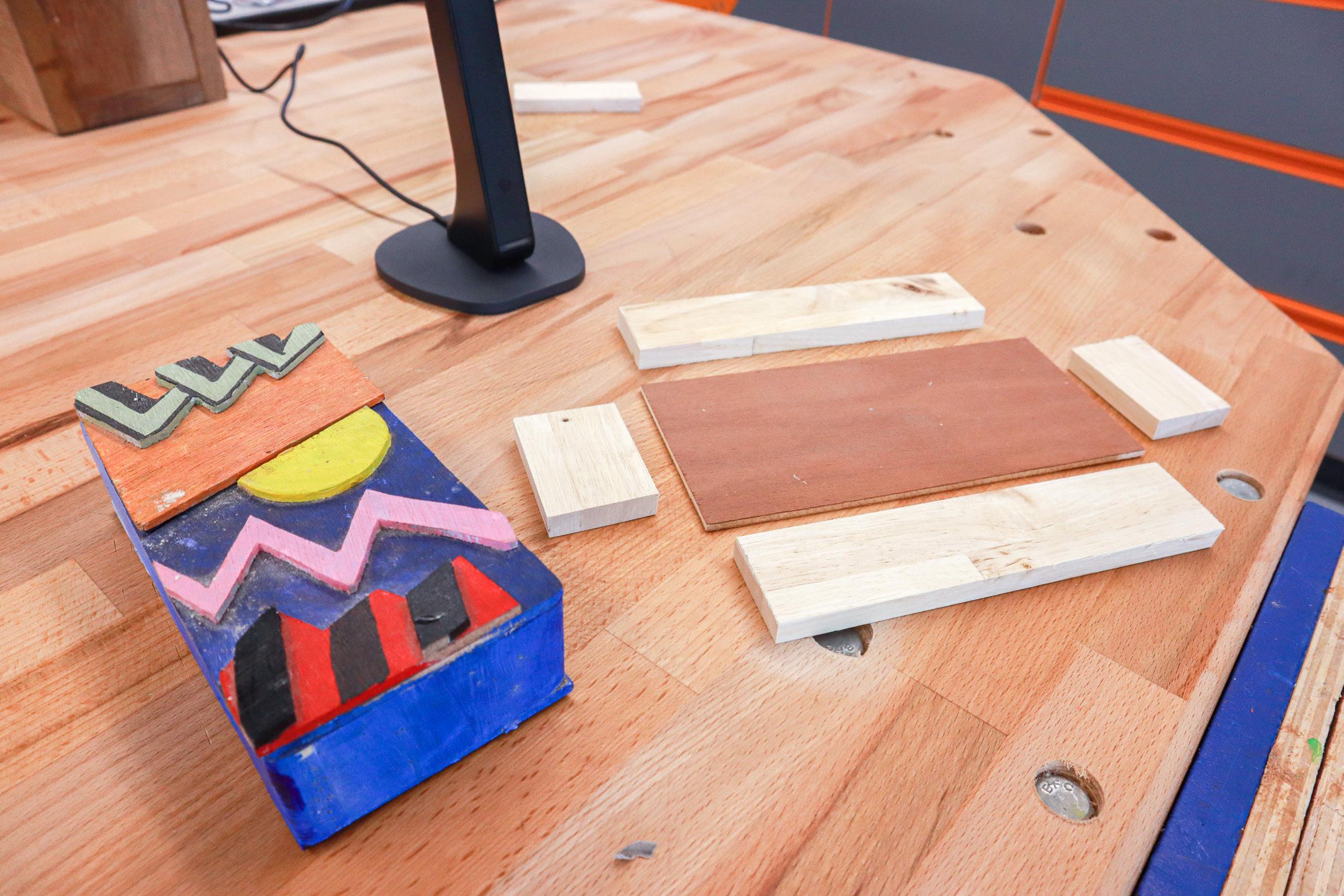
DESIGN TECHNOLOGY
Summer Term
Topic
• Project – Passive Amp
Work Covered
• Introduction to Design and Technology
• Materials and Properties
• Tools and Equipment
• Basic Sketching and Drawing
• Product Analysis
• Research and Design
• Environmental and Social Factors
• Prototyping and Making
• Evaluation and Iteration
• Health and Safety
Key Skills
• Introduction to the principles of design and technology, understanding its importance and relevance in everyday life
• Focus on different materials used in design and technology, their properties, and their applications
• Development fundamental sketching and drawing skills
• Learn to analyse existing products, understanding their design features, functions, and how they're used by people. Explore the design process, including research, idea generation, concept development, and iteration. May include work on simple design projects, coming up with their own solutions to specific problems. Hands-on projects, creating prototypes of their design ideas using various materials and techniques
• Explore the environmental and social impacts of design and technology, including topics like sustainability, ethical considerations, and user-centred design
• Evaluate their designs and prototypes, identifying areas for improvement and iterating on their ideas
Assessment
• Booklet Folio 50%
• Project 50%
Michaelmas Term
Topic
• The Broken Circus
Work Covered
• Students will explore physical theatre, ensemble storytelling, and character creation through the theme of The Broken Circus. Using devised drama techniques, they will develop original scenes that reflect themes of transformation, spectacle, and hidden emotion. The term culminates in a performance showcase.
Key Skills
• Physical theatre: gesture, movement, rhythm, ensemble coordination.
• Characterisation: status, emotion, motivation, transformation.
• Devising: improvisation, still image, transitions, narrative structure.
• Staging: levels, proxemics, use of space, atmosphere.
Assessment
Students will perform original devised scenes inspired by The Broken Circus. Assessment will focus on vocal and physical expression, ensemble cohesion, and clarity of dramatic intention. Performances will feature in the Michaelmas Classroom Showcase.
Lent Term
Topic
• National Theatre Project – Life of Pi
Work Covered
• Students will evaluate a professional online performance of Life of Pi, exploring its theatrical impact. They will analyse design elements, staging, and actor choices, and respond through creative tasks and written evaluations.
Key Skills
• Live theatre analysis: mood, atmosphere, audience impact.
• Design interpretation: puppetry, lighting, sound, set, costume.
• Critical response: evaluation, reflection, use of drama terminology.
• Creative response: scene recreation, directorial choices, design sketches.
Assessment
• Students will complete a written evaluation of Life of Pi, demonstrating their understanding of theatrical techniques and audience engagement. Assessment will focus on AO3: knowledge and understanding of how drama and theatre is developed and performed. They will also practically explore the work.
Summer Term
Topic
• Shakespeare Devising – A Midsummer Night’s Dream
Work Covered
• Students will explore Shakespeare’s A Midsummer Night’s Dream through devising techniques. They will reinterpret scenes using physical theatre, ensemble work, and the influence of practitioner Peter Brook.
Key Skills
• Shakespeare: language, character, comedy, structure.
• Devising: improvisation, monologue, duologue, ensemble storytelling.
• Practitioner focus: Peter Brook’s “empty space”, minimalism, actor-audience relationship.
• Performance: vocal and physical control, thematic clarity, staging.
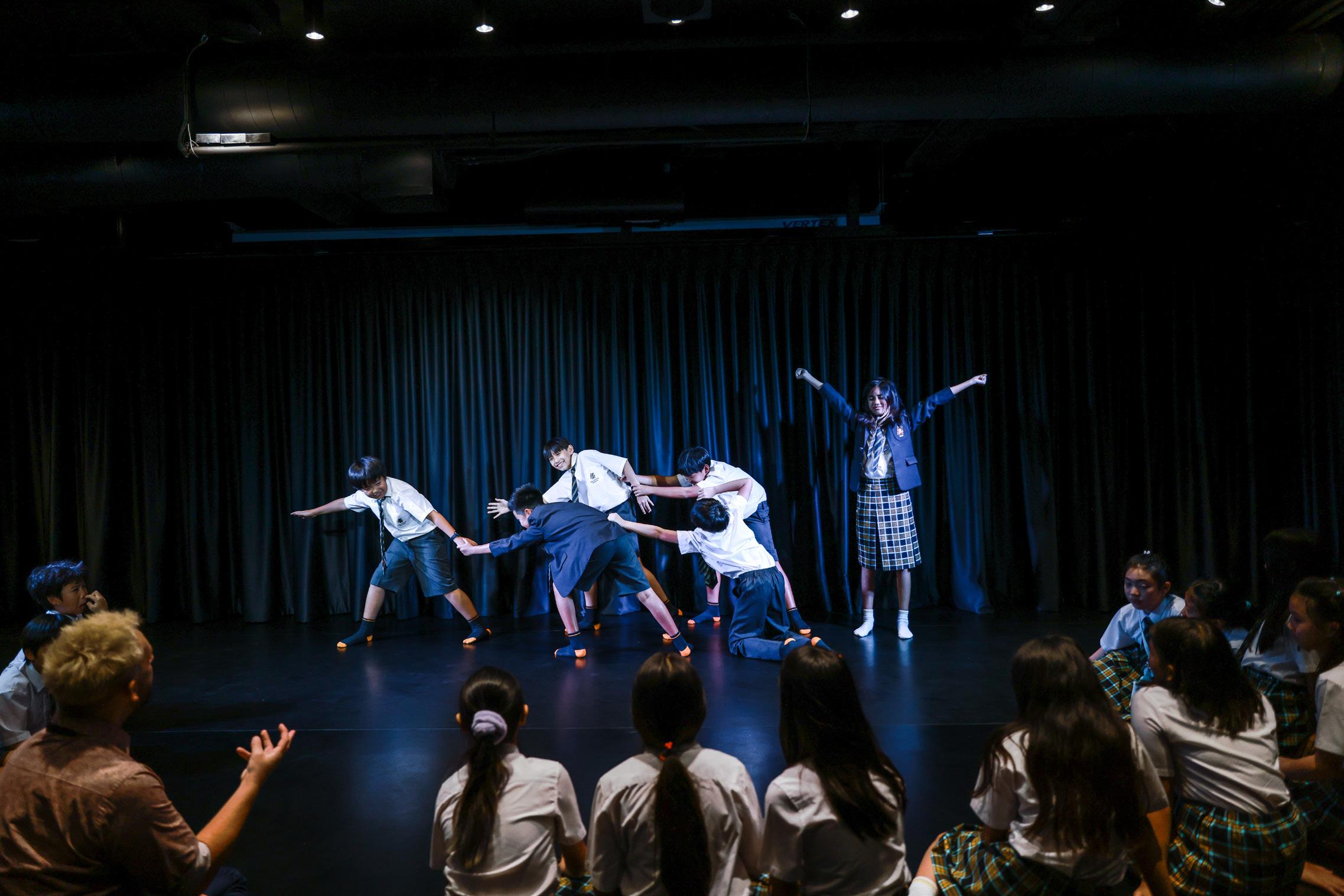
Michaelmas Term
Topic
• Narrative Writing (fiction)
• Novel study: Cirque Du Freak by Darren Shan
• Building Blocks of Writing- Description
Work Covered
Novel Study
• Students will study the conventions of narrative prose such as characterisation; setting; Freytag’s pyramid; tension; openings and endings.
• They will also learn how to analyse the writer’s language and structural choices and will begin to learn formal essay writing skills.
• They will also demonstrate skills of comprehension, inference and empathy by writing imaginatively from the perspectives of characters within the text.
Writing Unit
• Students will revise the rules of sentence construction and will learn how to identify the components of simple, compound and complex sentences and use these effectively in their own work. Students will learn how to avoid using fragment sentences and comma splicing.
• Students will also learn how to effectively employ figurative language techniques such as metaphor, simile and personification in their own work, and will use these to create imagery of a setting.
Key Skills
• Writing to narrate
• Writing to describe
• Genre-Transformation
• Comprehension
• Inference
• Analysis
• Evaluation
• Sentence construction
• Written accuracy Assessment
• Genre-transformation task on Cirque Du Freak
• Descriptive writing piece
Topic
• Exploring and Creating Fictional Characters
• Advertising and Rhetoric
Work Covered
Exploring and Creating Fictional Characters
• Students will study how writers construct fictional characters and consider the techniques used to make them engaging and convincing. Through close reading of a range of texts, they will analyse how description, dialogue, and action are employed to shape character and convey ideas. Students will also apply these techniques in their own creative writing, developing the ability to craft characters with distinct voices and perspectives. The unit introduces key skills in both literary analysis and creative composition, providing a strong foundation for further study.
Advertisement and Rhetoric
• Students will learn what advertisement is and the different formats used to advertise in today’s world. Students will consider the ethics of advertisement. They will then examine the use of images, presentational devices such as colour, and persuasive language to explore why certain adverts are so effective. Students will also learn about target markets and target audiences and will learn how to select appropriate language to appeal to specific markets and audiences.Some students will learn about Aristotle’s rhetorical appeals: ethos, pathos and logos.
Key Skills
• Comprehension
• Inference
• Analysis
• Evaluation
• Synthesis of information
• Persuasive methods/ rhetoric
• Essay writing Assessment
• Exploring and Creating Fictional characters – reading analysis based on a short extract; creative writing to create own fictional character
• Advertisement- Students complete an independent project where they create an advertisement campaign and produce a justification.
Summer Term
Topic
• An Introduction to Poetry
• Creative writing
Work Covered
Poetry
• A study of a selection of poetry entitled ‘An Introduction to Poetry’.
• A study of poetic techniques such as onomatopoeia, metaphors, similes and personification, enjambment, caesura.
The development of PEAR paragraph writing.
Creative writing
• Students will explore the conventions of creative writing and will read excerpts and short stories as inspiration for their own writing.
• They will revise the use of figurative techniques; use of structural techniques; paragraphing; dialogue.
Key Skills
• Technical accuracy
• Writing to Describe
• Comprehension
• Inference
• Analysis
• Evaluation
• Essay Writing Skills
Assessment

• Poetry- EOY exam on PEAR analysis of ONE poem studied.
Michaelmas Term
Topic
• Module 1 : C’est perso (It’s personal)
• Module 2 : Mon collège (My Senior School)
Work Covered
• Identity: name, numbers, age
• My self-portrait: likes and dislikes
• My personality: adjectives (masculine / feminine)
• Physical description: hair and eyes (singular / plural)
• School subjects: give opinions and justify them
• My timetable: 12 hour clock
Key Skills
• Learn new vocabulary – Understand and respond to simple questions – make simple and complex sentences
• Give opinions and justifications in simple and complex sentences – Talk / write about oneself and other people – Make short paragraphs
Assessment
• Continuous assessment of progress through the work done in class and Prep.
• Summative assessments at the end of each module
Lent Term
Topic
• Module 2 : Mon collège (My Senior School)
• Module 3: mes passetemps (my hobbies)
Work Covered
• At school in France (day routine)
• Food: the partitive article (du, de la, de l’, des)
• My laptop and my mobile: online activities, regular er-verbs
• Are you sporty? Vocabulary of sports, jouer + au, a la, aux
Key Skills
• Learn French verb conjugations in the present tense – talk about yourself and other people
• Use different articles and prepositions – Develop the 4 skills of listening, speaking, reading and writing
Assessment
• Continuous assessment of progress through the work done in class and Prep.
• Summative assessments at the end of each module
Summer Term
Topic
• Ma zone (Where I live)
Work Covered
• Where I live: places in town, say what there is and what there isn’t
• At the weekend: where you go, aller + prepositions
• What are you going to do?: near future
Key Skills
• Develop French conjugations in the present tense
• Understand the use of conjugated and infinitive verb forms
• Introduction of the near future Assessment
•
•

Michaelmas Term
Topic
• Silk Roads
• Samurai Japan
Work Covered
• Silk Roads- This is our Y7 global history topic. It is primarily focused on economic history, looking at the role the Silk Road played in modernising both ‘East’ and ‘West’. Pupils learn about the spread of knowledge, religion and the trade in goods between Asia, the Middle East and Europe
• Samurai Japan- This is our Y7 Asian history topic. It is focused primarily on social history, looking at who the Samurai were and the role they played in Japanese culture and society. This course will chart the history of the Samurai from the 12th century to their abolition by the Meiji Emperor in the mid 19th century
Key Skills
• Students will learn: (i) chronology (ii) how to analyse primary and secondary sources (iii) comprehension skills based on guided reading (iv) how to construct a focused written response with a judgement supported by evidence (v) how to participate effectively in discussion (vi) oral presentation skills
Assessment
• Summative assessment: Two 30-minute written assessments in the middle and at the end of each unit that are designed to test their understanding of historical figures, events and the skills we have developed
• Formative assessment: Continuous tracking of student written work and oral responses in lessons using a variety of techniques
Lent Term
Topic
• What is a Geographer?
Work Covered
• This will be our first physical geography unit. It will focus on developing a whole host of skills related to using maps. This includes: (I) Locating continents (ii) lines of latitude and longitude (iii) 4 and 6 figure grid references (iv) identifying map symbols (v) how height and scale are represented (vi) sketching skills
Key Skills
• Students will develop the ability to use and interpret maps. They will develop skills related to the points outlined above
Assessment
• Summative assessment: Two 30-minute written assessments in the middle and at the end of each unit that are designed to test student understanding of geographical content and the skills developed
• Formative assessment: Continuous tracking of pupils’ written work and oral responses in lessons using a variety of techniques
Summer Term
Topic
• Kenya Work Covered
• This unit explores the climate of Kenya, geographical features of the country, the distinct cultures of the country particularly the Kikuyu and Maasai tribes, urban life in Kenya (Nairobi) and commercial farming.
Key Skills
• (i)Interpreting and drawing climate graphs (ii) developing map analysis skills (iii) analysis and evaluation of different ways of life- developing intercultural understanding (iv) understanding different urban landscapes (v) Essay writing using evidence
Assessment
• Summative assessment: Two 30-minute written assessments in the middle and at the end of each unit that are designed to test pupil understanding of geographical content and the skills developed.
• Formative assessment: Continuous tracking of pupils’ written work and oral responses in lessons using a variety of techniques

Michaelmas Term
Topic
Mandarin Foreign Language Group:
• Introduction to Chinese
• Me and My family
Mandarin First Language Group:
• Place and the world around us
Work Covered
Mandarin Foreign Language Group:
• Classroom Language.
• Chinese characters and radical knowledge.
• Basic greeting and self-introduction
• Numbers
• Introduction to family members
Mandarin First Language Group:
• Prose Appreciation
• Appreciation of ancient poetry
• Accumulate good words and sentences
Key Skills
Mandarin Foreign Language Group:

• Listening: understand the main points and some of the detail about Me and My Family from spoken passages in variety sentences
• Speaking: ask and answer simple questions and talk about the personal information
• Reading: understand key radicals and basic characters; understand the main points and some of the detail in short written texts from familiar contexts related to Me and My Family
• Writing: be able to write key radicals and basic characters; write short sentences following a model, and fill in the words on a simple form
Mandarin First Language Group:
• Students can improve their literary knowledge through reading
• Students can express their ideas clearly through writing
Assessment
Formative assessment: Quizes & Prep
• End of unit assessment
Lent Term
Topic
Mandarin Foreign Language Group
• Families and Hobbies
Mandarin First Language Group
• Famous buildings and historical figures
Work Covered
Mandarin Foreign Language Group:
• Description of families
• Pets
• Introduction to my hobbies
• Adjectives to expand ‘why’ questions
• Time phrases
Mandarin First Language Group:
• Explore different architectural styles
• Learn about famous people’s deeds
Key Skills
Mandarin Foreign Language Group:

• Listening: Understand the main points from short spoken passages about Family and Hobbies
•
• Speaking: Give a short, prepared talk about the Family and Hobbies
• Reading: understand the main points and some of the detail in short written texts from familiar contexts related to Family and Hobbies
• Writing: write a few short sentences to describe Family and Hobbies, with support, using expressions that they have already learnt.
Mandarin First Language Group
• Can stimulate students' curiosity
• Be inspired by the spirit of celebrities
Assessment
Formative assessment: Quizes & Prep
• End of unit assessment
Summer Term
Topic
Mandarin Foreign Language Group:
• Food and health
Mandarin First Language Group:
• Daily life and future
Work Covered
Mandarin Foreign Language Group:
• Food and Drink
• Introduction to breakfast, lunch and dinner.
• Ordering meals in restaurants
• Healthy diet
• Revision of topics covered in the year
Mandarin First Language Group:
• Combine with students' daily life to express values
• Talk about future educational and career plans
Key Skills
Mandarin Foreign Language Group:
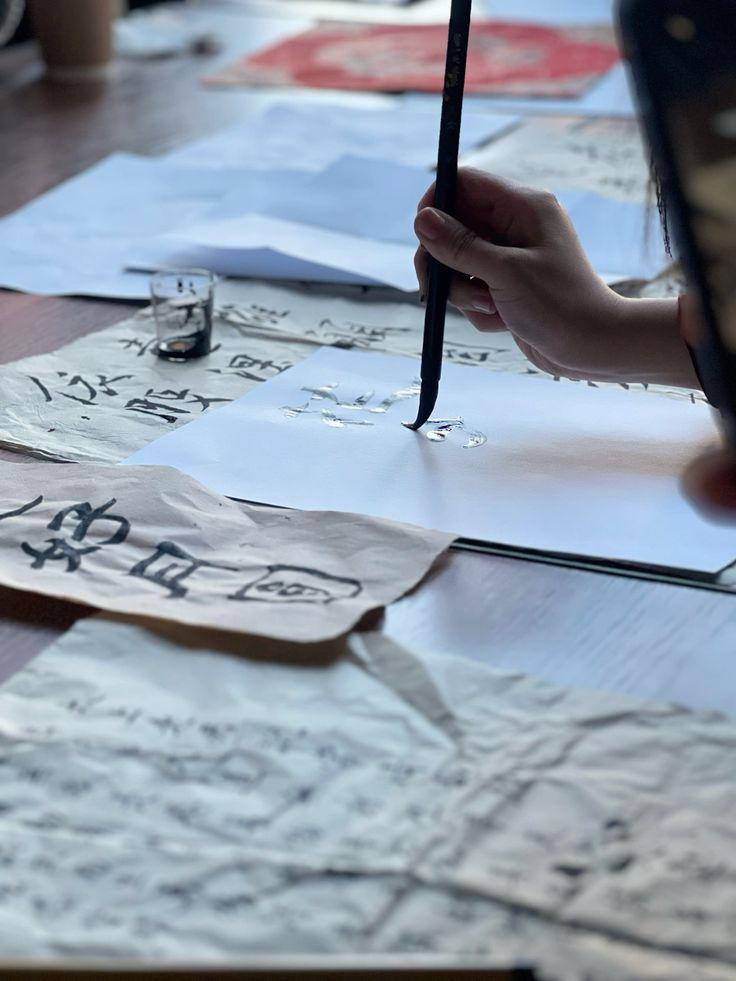
• Listening: understand the main points and opinions in spoken passages about food and health
• Speaking: take part in short conversations about food and describe their physical condition
• Reading: understand the main points and personal responses in written texts related to food and health
• Writing: write short texts on food and health, adapting language that they have already learnt.
Mandarin First Language Group:
• Cultivate a passion for life
• Establish correct values about students themselves
• Be able to think and plan
Assessment
• Formative assessment: Quizes & Prep
• Summative assessment: End of Year Examination
Michaelmas Term
Topic
• Number, Algebra, Geometry, Statistics
Work Covered
• Reviewing number concepts and place value
• Factors, multiples, primes
• Indices (whole numbers)
• Lines, angles, and shapes
• Collecting, organising, and displaying data
Key Skills
• Consolidation of KS2 skills into KS3 fluency
• Using rules of arithmetic confidently, including indices
• Recognising and classifying 2D shapes and angle properties
• Organising data into frequency tables, bar charts, and pie charts
Assessment
• Constant formative assessment and Prep tasks
• End of topic tests on Number, Indices, Angles, and Data
Topic
• Number, Algebra, Geometry, Probability Lent Term
Work Covered
• Fractions, decimals, percentages, and standard form
• Algebraic expressions, equations, and formulae
• Perimeter, area, and volume of 2D and 3D shapes
• Probability: experimental, theoretical, and diagrams

Key Skills
• Operating with fractions, decimals, and percentages accurately
• Expanding and simplifying algebraic expressions
• Substituting into and rearranging simple formulae
• Measuring and calculating perimeter, area, and volume
• Using probability diagrams (including possibility spaces)
Assessment
• Constant formative and end of topic
Summer Term
Topic
Number, Algebra, Geometry, Statistics
Work Covered
• Sequences and sets
• Straight line graphs and linear equations
• Pythagoras’ theorem in right-angled triangles
• Similarity and congruence

• Averages (mean, median, mode) and measures of spread (range, IQR)
Key Skills
• Recognising and generating sequences (arithmetic and simple non-linear)
• Plotting and interpreting straight line graphs
• Applying Pythagoras’ theorem to simple contexts
• Distinguishing between similarity and congruence in geometry
• Analysing and interpreting statistical data sets
Assessment
Constant formative and end of topic
Michaelmas Term
Topic
• Theme and Variation / Music Tech
Work Covered
• The Theme and Variations unit will focus on exploring and developing keyboard skills through creative work using the theme and variation form. In the second half of the term, students will be introduced to music technology, learning how to sequence, import loops, and compose music for a video track.
Key Skills
• Developing keyboard skills and aural awareness: Students will learn to create two melodic variations and perform them to the class.
• Students will explore and learn how to use GarageBand, experimenting with different loops and electronic sound sources. They will also learn how to sequence and import their own loops
• Assessment
• Perform a solo of the main theme along with two melodic variations.
• How does the music link to the video, and how is it connected to the music software being used?

Lent Term
Topic
• World drums/ Orchestra
Work Covered
• Students will learn about rhythm and connect this knowledge to traditional African drumming techniques.
• Exploring the instruments of the orchestra through both playing activities and listening to a range of pieces.
Key Skills
• Students will learn ostinato patterns and key techniques on the djembe, leading to the creation of their own composition.
• Exploring the different timbres of instruments, learning to identify instrument families and arrange them in pitch order.
Assessment
• Performance.

Summer Term
Topic
• Jazz improvisation/ Band arrangements
Work Covered
• Students will develop their creative skills by exploring the blues scale to create original improvisations. In the 2nd half of term, they will also be introduced to arranging and performing cover songs as part of a band, learning how to structure and adapt music for different instruments.ence
Key Skills
• Exploring blues scales and learning how to improvise over chord progressions, developing confidence in using different notes, rhythms, and melodic ideas to create original solos.
• Creating arrangements and developing leadership skills while working in bands, taking responsibility for musical decisions such as structure, dynamics, and performance direction.
Assessment
• Performance assessment: Students will prepare and perform a chosen piece (solo and as part of a group) that demonstrates technical accuracy, stylistic understanding, and musical expression.
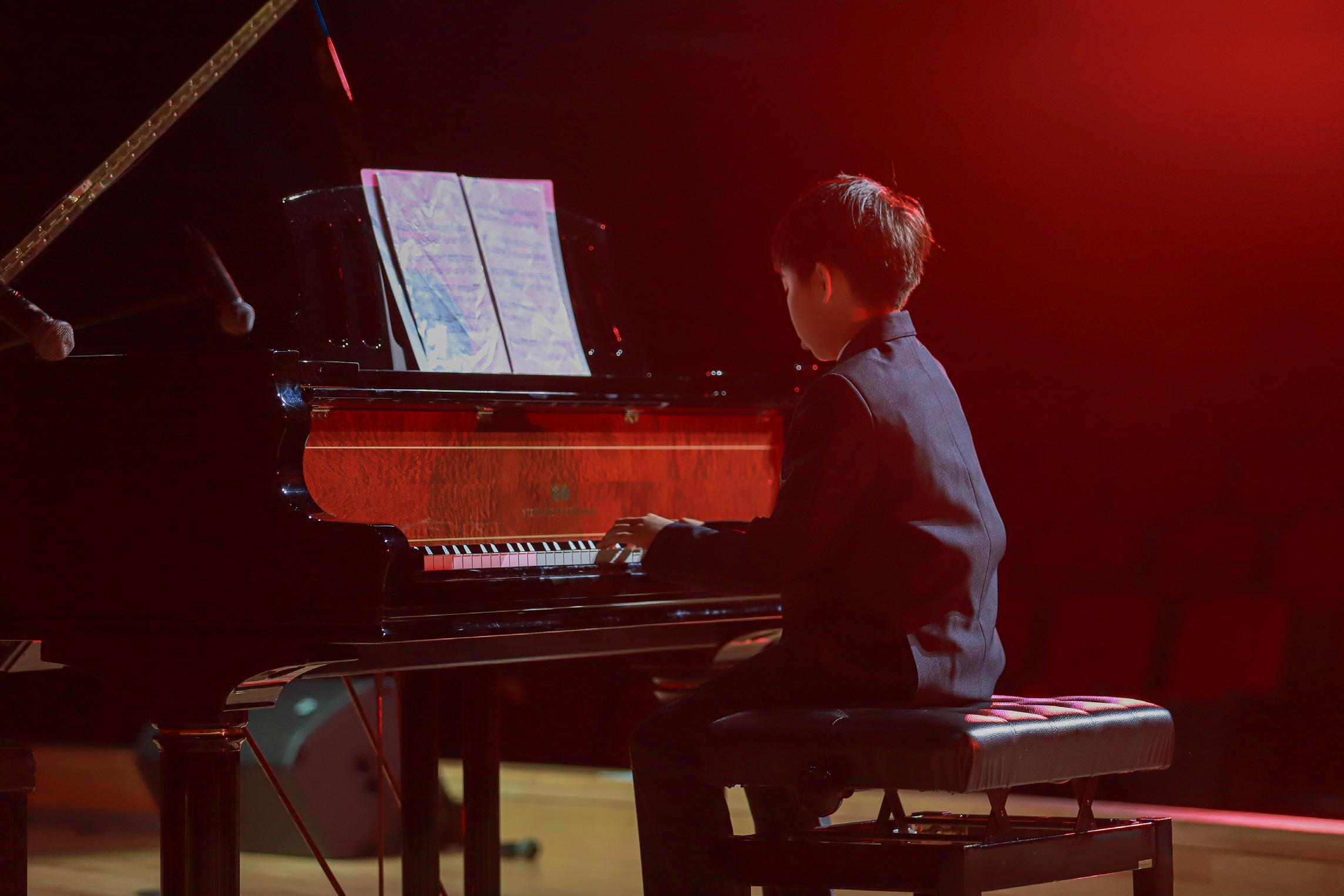
PHYSICAL EDUCATION
Michaelmas Term
Topic
• Invasion Games
• Net and Wall Games
Work Covered
• Introduction to invasion games (e.g., basketball, football, handball)
• Basic rules and game principles
• Individual skills development (dribbling, passing, shooting)
• Teamwork and communication in game situations
• Introduction to net and wall games (e.g., tennis, badminton, volleyball)
• Basic rules, techniques, and game strategies
• Individual skills development (serving, hitting, receiving)
• Understanding court positioning and movement
Key Skills
• Fundamental movement skills (running, dodging, pivoting)
• Technical skills specific to invasion games (e.g., ball control, marking, positioning)
• Decision-making and tactical awareness
• Sportsmanship and fair play
• Hand-eye coordination and racket skills
• Technical skills specific to net and wall games (e.g., serving, forehand, backhand)
• Understanding game tactics and strategies
• Sportsmanship and fair play values in game situations
Assessment
• Head: Knowledge and understanding of invasion games rules, strategies, and tactics
• Heart: Dhemonstrating sportsmanship, teamwork, and fair play values
• Hands: Applying technical skills and decision-making abilities in game situations
• Head: Knowledge and understanding of net and wall game rules, techniques, and tactics
• Heart: Demonstrating sportsmanship, fair play, and respect for opponents
• Hands: Applying technical skills and decision-making abilities during game play
PHYSICAL EDUCATION
Term
Topic
• Heart and Sole
Work Covered
Introduction to the components of fitness (e.g., cardiovascular endurance, muscular strength, flexibility)
• Basic fitness testing and personal goal setting
• Exposure to different training methods (e.g., circuit training, interval training, bodyweight exercises)
• Understanding the FITT principle and how to apply it
• Reflection on personal progress and well-being
Sport Education: Netball
• Introduction to Sport Education model and its components
• Team formation and selection of team roles
• Learning and practicing fundamental skills within chosen sport
• Being involved in intra-class tournaments and mini-leagues
• Understanding the rules and strategies of the chosen sport
Key Skills
Heart and Sole:
• Self-assessment and goal setting
• Safe and effective exercise technique
• Understanding and applying fitness principles
• Collaboration and peer support
• Reflective thinking and personal responsibility
Sport Education: Netball
• Teamwork, collaboration, and communication within the team
• Application of sport-specific skills and techniques
• Leadership and responsibility in assigned team roles
• Understanding and implementation of game tactics
Assessment
Heart and Sole:
Heart: Engagement and effort in sessions as well as a willingness to support others and reflect on personal progress
Hands :Execution of exercises with correct technique
Summer Term
Topic
• Aquatics (Synchronised Swimming)
• Aesthetics (Dance inspired by Picasso’s ‘Guernica’)
Work Covered
Aquatics:
• Introduction to synchronised swimming techniques and basic movements
• Learning synchronised routines and formations
• Understanding water safety and synchronised swimming rules
• Choreographing and performing a synchronised swimming routine
Aesthetics:
• Introduction to the painting 'Guernica' by Picasso and its themes
• Exploring the emotions and messages conveyed in the artwork
• Learning dance techniques and choreography inspired by the painting
• Performing a dance routine expressing the themes of 'Guernica'
Key Skills
Aquatics:
• Coordination and synchronisation of movements with teammates
• Water confidence and swimming skills
• Rhythm, timing, and precision in performing synchronised movements
• Understanding and following safety guidelines in the water
Aesthetics:
• Interpretation and expression of emotions through dance movements
• Coordination, body control, and spatial awareness in dance
• Creativity in choreographing movements inspired by the artworkAppreciation and understanding of the connections between art and dance
Aquatics:
• Head: Knowledge of synchronised swimming techniques, application of aesthetics understanding, and safety guidelines
• Heart: Collaboration, teamwork, and support for teammates in synchronized routines
• Hands: Execution of synchronized movements with precision and synchronization with teammates
Aesthetics:
• Head: Knowledge and understanding of the themes and messages in 'Guernica' woven into choreography.
• Heart: Working collaboratively and respectfully as a group.
• Hands: Execution of dance movements with technical proficiency and artistic expression
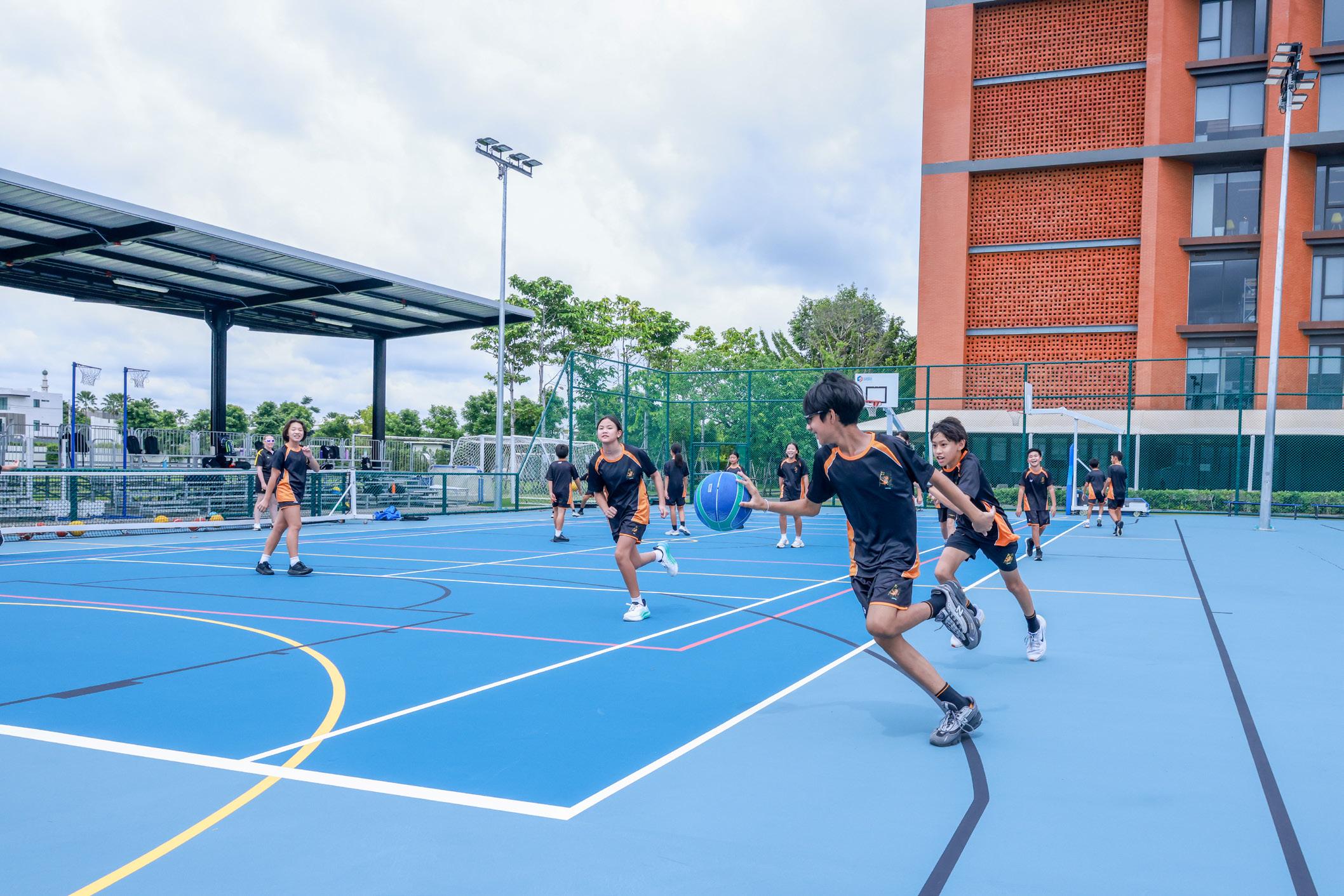
Michaelmas Term
Topic
• 7A- Cells, 7F Acids and Alkalis, 7I Energy, 7H Atoms, elements and molecules, 7K Forces and 7D Ecosystems Project over holidays
Work Covered
• Life processes and Organ Systems; Acidity and Alkalinity, pH scale,
• Fuels and Energy Transfers, Atoms, Elements and Compounds.
• Solids, liquids and gases, diffusion and air pressure.
• Food Chains and Food Webs
Key Skills
• Working scientifically, graphs and interpretation of data.
Assessment
End of Topic Tests on 7G, 7C, 7E and 7L
Lent Term
Topic
• 7J Electricity, 7B Sexual Reproduction and science projects
Work Covered
• Electricity; looking at series and parallel circuits.
• Animal sexual reproduction, reproductive organs, becoming pregnant, gestation and birth, endangered species and the work of zoos.
Key Skills
• Research on Endangered species and report creation using literacy and graph skills.
Assessment
• End of Summer Examination
Summer Term
Topic
7J Electricity, 7B Sexual Reproduction and science projects
Work Covered
• Electricity; looking at series and parallel circuits.
• Animal sexual reproduction, reproductive organs, becoming pregnant, gestation and birth, endangered species and the work of zoos.
Key Skills
• Research on Endangered species and report creation using literacy and graph skills.
Assessment
End of Summer Examination

Michaelmas Term
Topic
Talking about myself
Work Covered
• Basic personal information: name, age, birthday and pets. Introducing ourselves and other members of the family.
• Talking about how you are doing in the present and the past tense (1st person singular and plural and 3rd person singular)
• (¿Qué tal? ¿Cómo estás hoy? ¿Cómo estabas ayer?
• Estoy/ estaba bien/ mal/ regular/ fatal enfadado/ contento/ nervioso/ triste/ cansado) Tengo/tenía miedo/ calor/ frio/ hambre/ sed)
• Likes and dislikes and giving opinions.
• Describing oneself and family members: personality and physical description.
• Christmas in Spain Quiz
Key Skills
• Phonics: students will learn the sounds of Spanish.
• Grammar:
• Adjective agreement.
• Verbs Tener-Ser- Estar in the Present Tense in all 6 persons.
• Verbs Tener-Ser-Estar in the Imperfect (1-3 persons)
• Possessive adjectives (all persons)
• Me gusta/ Me encanta
• Comparatives más… que menos…..que
Assessment
• Continuous assessment through prep and fortnightly vocabulary tests.
• Classroom test (reading and listening) in November before data drop M2.
Lent Term
Topic
• Free time
Work Covered
• Expressing simple opinions with reasons why.
• Me Gusta/Me encanta/Me gustaba/Me encantaba/suelo/ si pudiera me gustaría
• + infinitive (hobbies)
• Describing what you do in your spare time, opinions on it and when you do the activities.
• Expressing plans for next weekend/week.
• Si pudiera me gustaría/ voy a + infintive
• Learning sports you do and are going to do and giving opinions about these.
• Telling the time and learning about the weather.
• Easter in Spain and South America
• Easter egg hunt (verbs)
Key
Skills
Grammar:
• Conjugating verbs in the Present Tense.
• Irregular verbs in the present tense: HACER, SALIR, IR, DAR
• Boot Verbs (Jugar)
• Future Tense: Voy a+ infinitive.
• Weather
• To Revise question words.
Assessment
Vocabulary tests, classnotes, speaking practice, prep and topic end of tests in April.

Summer Term
Topic
Revision of year 7 topics + school subjects
Work Covered
• Topic of school: subjects and teachers using previous knowledge of descriptions.
• Preparing oral exam: questions about yourself and your free time. Students will have the questions and will prepare them in class.
• Revision of tenses and grammar learnt during the year
Key Skills
• Focus of productive skills: Speaking and writing in preparation for oral exam
Assessment
• End of year exam with all topics covered (translation from and to English)
• Oral exams to be done in class (student will know questions in advance to prepare)
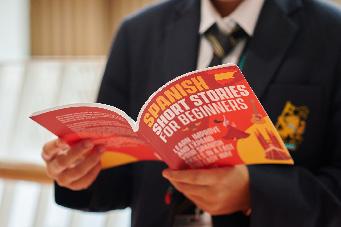
Michaelmas Term
Topic
Thai
• การอ่านร้อยแก้วและการอ่านออกเสียง
• การเขียนประโยคและเรียงความขันพื นฐาน
• การเรียบเรียงประโยคเพื อเล่าเรืองและถ่ายทอดความคิด
• การใช้คําและชนิดของคําในบริบทภาษา
Non – Thai
• Greetings
• Numbers
• Telling Time
• King Rama X
• Days, Months & Birthdays
• Classroom Objects & Colours
• Daily Routines
• Thai Houses and Lifestyle
Work Covered
Thai
• ฝึกการอ่านร้อยแก้วอย่างถูกต้อง
• เรียนโครงสร้างประโยค

• ฝึกเรียงประโยคตามลําดับเหตุการณ์ ใช้คําสรรพนามแทนคําซํา
• ศึกษาคําประเภทต่าง
• Research on Thai cultural topics
• Telling time worksheets
• Listening to short Thai passages, stories, and articles
• Group discussions and idea sharing
• Creating models of Thai houses
Key Skills
Thai
• การอ่านออกเสียง:
• การเขียนเรียงความ:
• การเล่าเรือง:
• การใช้คํา:
Non – Thai
• Understanding Thai culture and study topics
• Presenting and discussing knowledge in Thai
• Telling time in Thai from morning to night
Assessment
Thai
• ผลงานในชันเรียน
• ประเมินท้ายบทเรียน
• การนําเสนอผลงาน
Non – Thai
• Ongoing formative assessments
• Topic-based quizzes
• Q&A sessions
• Listening and speaking tests

Lent Term
Topic
Thai
• การอ่านจับใจความและแยกข้อคิดเห็น
• การตีความสํานวนและโวหารในวรรณกรรม
• การเขียนย่อความ
• การเขียนจดหมายส่วนตัว
Non – Thai
• Objects & Prepositions
• Clothing
• Thai National Costumes
• Money & Shopping
• Thai Markets
• Thai Food Work Covered Thai
• ฝึกระบุใจความสําคัญ
• เรียนองค์ประกอบจดหมาย
Non – Thai
• Topic-related worksheets
• Group work and role play for speaking practice
• Research on Thai cultural topics
• Designing Thai national costumes
Key Skills
Thai
• การวิเคราะห์ใจความ:
• การวิเคราะห์ภาษาและวรรณศิลป์:

Non – Thai
• Understanding Thai culture and study topics
• Presenting and discussing knowledge in Thai
• Using Thai currency in markets and stores
• Ordering Thai food
Assessment
Thai
• ผลงานในชันเรียน
•
• ประเมินท้ายบทเรียน
•
• การนําเสนอผลงาน
Non – Thai
• Ongoing formative assessments
• Topic-based quizzes
• Q&A sessions
• Listening and speaking tests
Summer Term
Topic
Thai
• การเขียนสร้างสรรค์
• การสือสารด้วยภาษาไทยและวรรณกรรมไทย
Non – Thai
• Thai Ingredients: Meat, Vegetables, Fruits
• Thai Street Food & Snacks
• Thai Beverages

• ฝึกวางโครงเรืองสัน
• ฝึกฟังคลิป/ข่าว
Non – Thai
• Topic-related worksheets
• Group work and role play for speaking practice
• Research on Thai cultural topics
• Cooking Thai food
Key Skills Thai
•
• การอ่านวรรณคดีและการเชือมโยง: อ่านกลอน
Non – Thai
• Understanding Thai culture and study topics
• Presenting and discussing knowledge in Thai
• Ordering Thai food with preferred ingredients
• Recognizing various Thai street foods and snacks
Assessment
Thai
• ผลงานในชันเรียน
• ประเมินท้ายบทเรียน
• การนําเสนอผลงาน
Non – Thai

• Ongoing assessment of classwork and tasks from prep
• Listening tests.
• Making a presentation using words and sentences that they have learnt
• Writing words with correct Thai vowels and changed vowels by ear
Wellington College International School Bangkok 18 Krungthep Kreetha Road, Thap Chang, Saphan Sung, Bangkok
info@wellingtoncollege.ac.th 02 087 8888
wellingtoncollege.ac.th
#WeAreWellington
